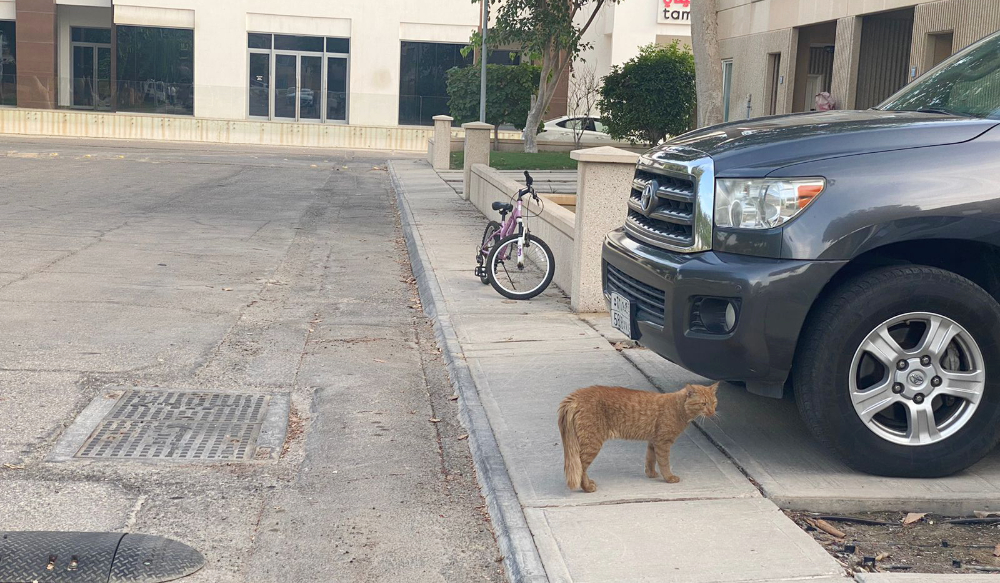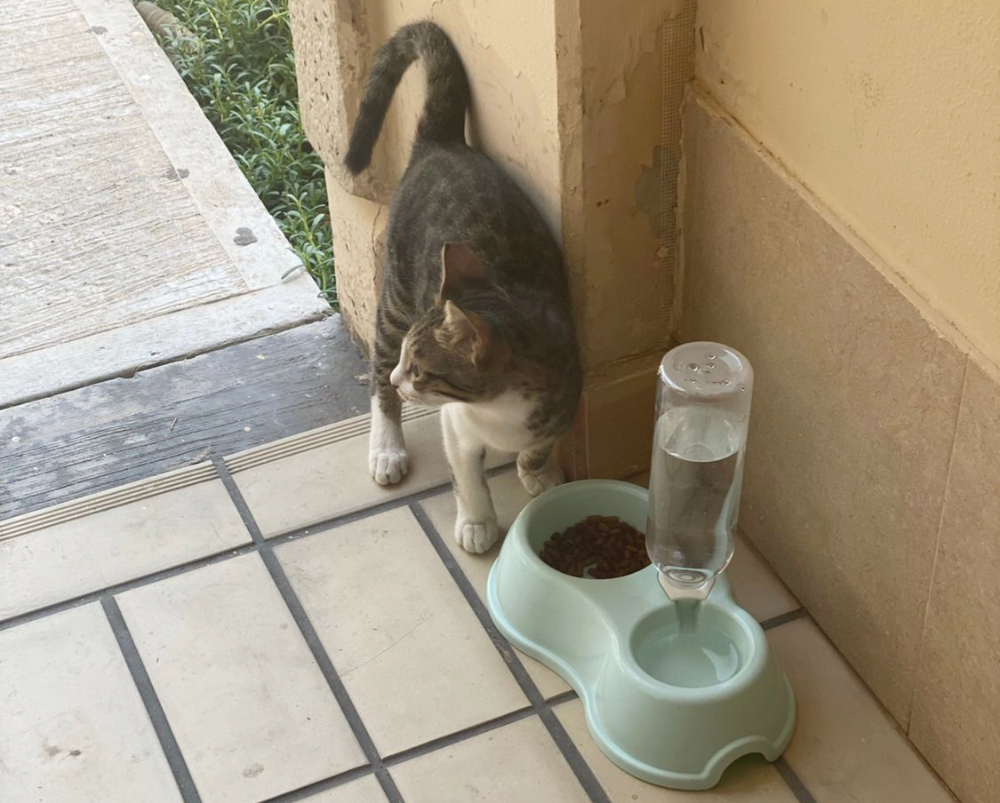DHAHRAN: At the tucked away Al-Mutlaq compound, situated on the main highway at the center of Dammam, Alkhobar and Dhahran, is a community of cat whisperers saving as many felines as they can.
The compound’s residents are being seen by some local residents as the saviors of many unwanted cats in the area. The problem started in 2016 when it began to rain cats and, well, cats. The area was overrun by strays that had sauntered in, had shrieking, fur-flying fights, and seemingly terrorized any and all human night walkers they came across.
With the population rising, word quickly spread in the neighborhood that the compound’s residents would take in and care for these strays. This resulted in many residents of the nearby neighborhoods dropping off unwanted kittens near the main gate and driving away.
These kittens would wander through the gate, pass the friendly security guards and make themselves at home. A group of concerned residents noticed the overpopulation and decided to raise cash so that they could vaccinate and neuter these furry animal friends.
HIGHLIGHTS
• The ‘Trap, Neuter and Return’ group consists of Sally Brown, Jawahir ‘Juju’ Islam, Rekha Nair, Laura Masoni, and Sanaa Tarneem Mohammed. ‘We started this group’s TNR program in 2016 — this was when the problem was overwhelming. We always had cats in the compound, workers were feeding them, families would feed them, but over a period of time, we saw a sudden upsurge of cats,” Mohammed said.
• It costs about SR300 ($79) for each TNR process and so they turned to Sally Brown for help. She had lived in Riyadh and on the west coast and brought in a wealth of information as a doctor, and how to raise funds to help these cats.
• Laura Masoni is responsible for the ‘dirty work’ of trapping with her 10-year-old daughter. They lure the cat with a small plate of food at around 10 p.m. and check on the trap in the morning at 6:30. All those trapped are announced on the social media group and are then taken to the Advanced Pet Clinic. They have to wrap the animals with towels so that they do not claw at their arms.
The group of mostly expats are the unofficial keepers of the Al-Mutlaq community’s “Trap, Neuter and Return” group, known as TNR. For these strays, the TNR is the best option, according to Al-Mutlaq’s community members because it allows these cats to be neutered and returned to their outdoor “homes.” This helps to control the health of the overall population and prevent the spread of disease.
When a cat has a “tipped ear,” it is the universally accepted method to identify a spayed, neutered and vaccinated feral cat. It means that a professional vet removed a tiny bit of the ear tip to signal that the cat is healthy and has been checked.
The group consists of Sally Brown, Jawahir ‘Juju’ Islam, Rekha Nair, Laura Masoni, and Sanaa Tarneem Mohammed. “We started this group’s TNR program in 2016 — this was when the problem was overwhelming. We always had cats in the compound, workers were feeding them, families would feed them, but over a period of time, we saw a sudden upsurge of cats,” Mohammed told Arab News.
“And the breeding cycles are quite close so they have just four-and-a-half months and then … they go into heat, so we will see cats all over, producing and reproducing kittens back-to-back. We found that people were abandoning — literally at the gate of the compound — and so we would have all these abandoned dumped cats coming in, trying to mark their territory and encroaching on the cats that were already there. And that led to a lot of fights and friction.
We want them to be healthier. We want them to be able to survive in the wild because let’s face it, not all of us can allow cats to come in and stay with us. If you look after a few of their needs and necessities like vaccinate them, spay them and neuter them, they’re happier. They’re well fed. They live longer.
Sanaa Tarneem Mohammed
“My children didn’t get to sleep because of the noise. We decided the problem was pressing enough for us to take a look at it. Most of us are expats and we got together and decided now we need to take a look at this,” she said.
Prior to that, and sadly in many parts of the country, people would trap stray cats and kittens and dispose of them in the desert — just abandon them or poison their food.
“We decided no, we couldn’t stomach that. So we got together with the compound management, with the owners and the compound manager, and we signed an agreement, saying that (we would take the) ownership and the responsibility of starting a group that would take care of trapping, neutering or spaying cats and releasing them back in the same place where we found them, to stabilize the population,” Mohammed said.
“So we did that. And then we got together again and raised funds as a community. Of course, some of us were not on board with the neutering and spaying part because they believe it’s un-Islamic and we are in a Muslim country. But I’ve been doing my own personal research about it. The Hadith I’ve read is that if it is (for) the betterment of the cat’s health, then neutering and spaying is okay, right? Because, ultimately, we’re not removing … parenthood from them, we want them to live a better life.
“We want them to be healthier. We want them to be able to survive in the wild because let’s face it, not all of us can allow cats to come in and stay with us. If you look after a few of their needs and necessities like vaccinate them, spay them and neuter them, they’re happier. They’re well fed. They live longer,” Mohammed said.
It costs about SR300 ($79) for each TNR process and so they turned to Sally Brown for help. She had lived in Riyadh and on the west coast and brought in a wealth of information as a doctor, and how to raise funds to help these cats.
“I’ve lived in the Kingdom for about 20 years, lived in this compound for 11 years. I first became involved with TNR cats in Riyadh at the National Guard Medical City due to (it) being overrun by cats. That was not too difficult (an) operation to pull off because you had thousands of people living there. So we could work in groups.
Brown said that in Jeddah, in Rabigh, it was also not difficult to do this because there was a large group of people able to help. The Al-Mutlaq compound, in contrast, is small.
“Then along with my friends, we started this group, we became aware of the fact we were being overrun during the kitten season. It wasn’t uncommon to find a cat lying out on the green as a day-old, they would have to be taken in and cleaned up or they would die.
“The mothers would leave them because they couldn’t deal with them. So we got together and we thought we’ll put together a group. The first thing I did when we set it up was contact the Advanced Pet Clinic that just opened here in Alkhobar.”
She contacted the APC’s owner, who agreed to offer them a 50 percent discount on all purchases. The resources have been used for sick and injured cats. However, Brown admitted that fundraising has been difficult, and compound residents have been asked to “sponsor a cat” with cash. Other fundraising efforts have included holding events, such as selling crafted and baked goods, with children and spouses pitching in to help.
“How we raise money is something of a continual battle, but we always get there somehow. What’s the most important thing also is, over the years, we have really stabilized the population here. The place was swarming at night with feral cats,” Brown said.
Rekha Nair, who became part of the TNR group two years ago, said a WhatsApp group has been set up to share information and concerns. “I go around the compound taking pictures of cats and then we do name them. So whenever we take a picture of a cat we know is tipped, that cat is already fixed, so we don’t have to worry about that one or take it to the vet. We share the photo in the WhatsApp group, that way we know where they’re hanging out and so we can put the trap there,” Nair told Arab News.
Laura Masoni is responsible for the “dirty work” of trapping with her 10-year-old daughter. They lure the cat with a small plate of food at around 10 p.m. and check on the trap in the morning at 6:30. All those trapped are announced on the social media group and are then taken to the APC. They have to wrap the animals with towels so that they do not claw at their arms.
“We have three traps, one cat at a time. They’re like big cages, we put some food inside. I do it almost every night because I used to work around the compound to feed the cats and if there are some new cats that need to be fixed, we share the picture with their location and say ‘yeah, so he needs to be done.’
“And that’s how, so far, we have been able to fix more than 50 cats since 2016. This year, we did around 20. When Juju (Jawahir Islam) was here, she used to set two or three cat traps every night around the compound. So we were able to catch three cats at once. And she (had) her driver … take them to the APC, which was useful,” Masoni told Arab News.
“People can donate directly to the APC, if they wish or they can donate to one of our houses. We tally it all up. Keep a record of all the money, that’s how it works,” Brown said.































